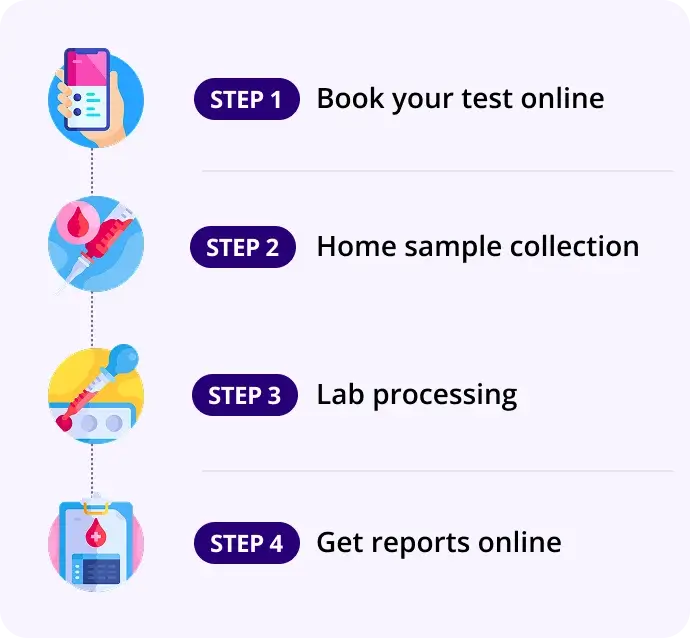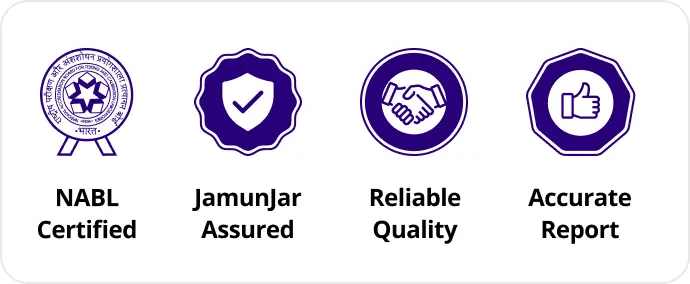Search for
Triglycerides
Heart
Report in 4Hrs
At Home
Fasting Required
Details
Store unused calories and provide energy. High levels can increase the risk of cardiovascular disease
₹21₹285
93% OFF
FREE:
Ai Insights
Triglycerides Test Information Guide
- Why is it done?
- Measures the level of triglycerides in the blood - a type of fat (lipid) that the body uses for energy storage and transportation
- Assesses cardiovascular risk and screens for dyslipidemia (abnormal blood lipid levels)
- Evaluates risk for heart disease, stroke, and peripheral arterial disease
- Performed during routine health screenings and annual physical examinations
- Monitors effectiveness of lipid-lowering medications and lifestyle modifications
- Ordered when evaluating patients with metabolic syndrome, diabetes, or family history of early heart disease
- Part of comprehensive lipid panel testing (also includes cholesterol, LDL, and HDL)
- Normal Range
- Normal (Desirable): Less than 150 mg/dL (1.7 mmol/L)
- Borderline High: 150-199 mg/dL (1.7-2.2 mmol/L) - Indicates increased cardiovascular risk
- High: 200-499 mg/dL (2.3-5.6 mmol/L) - Significant cardiovascular risk
- Very High: 500 mg/dL (5.6 mmol/L) or higher - Very high risk for cardiovascular disease and pancreatitis
- Units of Measurement: mg/dL (milligrams per deciliter) in the United States; mmol/L (millimoles per liter) in other countries
- Normal results indicate adequate lipid metabolism and lower cardiovascular risk when combined with favorable cholesterol and lipoprotein levels
- Elevated triglycerides may occur independently or in conjunction with high total cholesterol and low HDL cholesterol
- Interpretation
- Low Triglycerides (Less than 100 mg/dL): Optimal and represents excellent metabolic health; indicates good lipid profile management
- Elevated Triglycerides: Associated with increased risk of atherosclerosis and cardiovascular disease; may indicate metabolic dysfunction, insulin resistance, or need for lifestyle modifications
- Severely Elevated Triglycerides (Greater than 500 mg/dL): May indicate genetic lipid disorders (familial hypertriglyceridemia), secondary causes, or significant lifestyle factors requiring urgent intervention
- Factors Affecting Results:
- Non-fasting state - eating, especially carbohydrate-rich foods, significantly elevates triglyceride levels
- Alcohol consumption - even moderate alcohol increases triglyceride production
- Medications - estrogens, corticosteroids, retinoids, and some antipsychotics can elevate levels
- Obesity and insulin resistance - strongly associated with elevated triglycerides
- Diabetes and metabolic syndrome - impaired glucose and lipid metabolism increases triglycerides
- Kidney or liver disease - reduces ability to metabolize triglycerides
- Physical inactivity and sedentary lifestyle - associated with elevated triglycerides
- Clinical Significance: High triglycerides combined with low HDL cholesterol creates particularly high cardiovascular risk; used to calculate non-HDL cholesterol and assist in coronary risk assessment
- Associated Organs
- Primary Organ Systems:
- Cardiovascular system - most significantly affected by elevated triglycerides
- Liver - primary organ responsible for triglyceride synthesis and metabolism
- Pancreas - at risk when triglycerides are severely elevated (greater than 500-1000 mg/dL)
- Conditions Associated with Abnormal Results:
- Atherosclerosis and coronary artery disease - elevated triglycerides contribute to plaque formation in arteries
- Myocardial infarction (heart attack) - higher risk with persistently elevated triglycerides
- Stroke and cerebrovascular disease - increased risk with abnormal lipid profiles
- Type 2 diabetes - characterized by elevated triglycerides and insulin resistance
- Metabolic syndrome - cluster of conditions including elevated triglycerides, obesity, and hypertension
- Fatty liver disease (hepatic steatosis) - associated with elevated triglycerides and insulin resistance
- Acute pancreatitis - can be triggered by severely elevated triglycerides (greater than 500 mg/dL)
- Familial hypertriglyceridemia and other genetic lipid disorders - genetic predisposition to elevated triglycerides
- Hypothyroidism and kidney disease - secondary causes of hypertriglyceridemia
- Potential Complications of Elevated Triglycerides:
- Increased cardiovascular morbidity and mortality - major cause of premature death
- Acute pancreatitis with severe elevation - life-threatening inflammation of pancreas
- Progression of atherosclerotic disease - accelerated plaque formation and arterial narrowing
- Peripheral arterial disease - compromised blood flow to limbs and extremities
- Follow-up Tests
- Recommended Tests Based on Elevated Triglycerides:
- Lipid panel - comprehensive assessment including total cholesterol, LDL, HDL, and VLDL cholesterol
- Fasting lipid panel - if initial triglycerides were non-fasting to establish accurate baseline
- Glucose and fasting glucose tests - to assess for diabetes and metabolic dysfunction
- Hemoglobin A1C - monitors long-term blood glucose control and diabetes risk
- Thyroid function tests (TSH, Free T4) - evaluate for hypothyroidism as secondary cause
- Liver function tests (AST, ALT, GGT) - assess for hepatic steatosis and fatty liver disease
- Renal function tests (BUN, creatinine) - evaluate kidney disease as secondary cause
- Lipoprotein(a) [Lp(a)] - genetic risk factor for premature cardiovascular disease
- Apolipoprotein B (ApoB) - alternative measure of cardiovascular risk, sometimes used with high triglycerides
- Non-HDL cholesterol - calculated measure that helps assess residual cardiovascular risk
- When Severe Elevation (Greater than 500 mg/dL) is Present:
- Amylase and lipase - to exclude acute pancreatitis which can be triggered by severe hypertriglyceridemia
- Abdominal imaging (ultrasound or CT) - to assess for pancreatitis or other abdominal complications
- Monitoring Schedule:
- Every 4-6 weeks - after initiating medication therapy to assess treatment response
- Every 3-6 months - with stable lipid-lowering therapy for ongoing monitoring
- Annually - for patients with normal triglycerides as part of routine health maintenance
- Every 1-3 months - for newly diagnosed diabetes or metabolic syndrome with lifestyle modifications
- Fasting Required?
- Fasting Status: YES - Fasting is recommended for accurate triglyceride measurement
- Fasting Duration: 9-12 hours minimum (preferably 12 hours) before blood draw
- Optimal Timing: Morning appointment after an overnight fast is ideal
- Food and Beverage Restrictions:
- No food consumption during fasting period - even small amounts can elevate triglycerides
- Water only is permitted - drink plain water as needed during the fast
- No juice, coffee, tea, or other beverages - may contain sugars or additives that affect results
- Avoid chewing gum or candy - carbohydrates can influence triglyceride levels
- Medications to Avoid or Note:
- Continue regular medications - take prescribed medications as usual unless instructed otherwise by healthcare provider
- Inform provider of medications that may affect triglycerides - estrogen, beta-blockers, corticosteroids, retinoids, and antipsychotics
- Avoid alcohol - for 48-72 hours before the test as it significantly elevates triglycerides
- Additional Patient Preparation Requirements:
- Normal physical activity - avoid strenuous exercise 24 hours before testing as it may lower triglycerides
- Maintain current diet - do not change eating patterns before the test; results should reflect usual dietary intake
- Arrive relaxed - stress can affect lipid levels; sit quietly for 5 minutes before blood draw
- Bring insurance card and identification - ensure proper documentation and processing
- Non-fasting alternative - some laboratories now offer non-fasting triglyceride testing, though fasting remains more standard
How our test process works!

